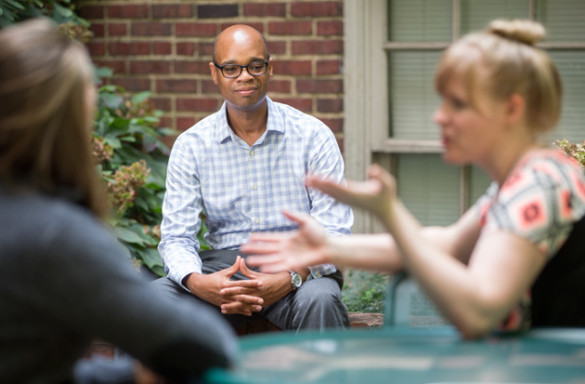
The next time you find yourself stumbling through a presentation or public speaking engagement, take heart. The most polished speakers are not necessarily the most effective ones, says Duane Watson, a new associate professor of psychology and human development at Peabody College.
Watson is a psycholinguist who studies the cognitive processes that underlie interactions between speakers and listeners. He is interested not only in what we say, but in how we say it—an aspect of language called prosody, which includes the stress, pitch, rhythm and intonation of speech.
Watson’s research finds the “uhs” and “ums” off-the-cuff speakers often employ when searching for their next words are not as detrimental to listeners as one might think.
“It turns out these speech errors, or disfluencies, are actually words,” he said. “They basically signal ‘I’m having trouble figuring out what I’m going to say—give me time—don’t jump in.’”
Psycholinguists have known for a while that such disfluencies can be helpful to listeners due to their ability to help the listener predict what words are coming next. Watson devised an experiment to support this theory.
“[rquote]These disfluencies are actually doing something to help you focus your attention on what you’re hearing,” he said.[/rquote]
Watson attended Princeton University and planned to become a physician, but an undergraduate linguistics class changed his course. “I found it fascinating because it focused on what I’d call ‘the computational aspects of the brain’—how the brain is like a computer,” he said. He earned his Ph.D. at MIT and completed three years of postdoctoral work at the University of Rochester before moving to the University of Illinois at Urbana–Champaign in 2005. Earlier this summer he moved his lab to Peabody, and he and his wife relocated their four young children to Nashville.
Another of Watson’s experiments involves gesture, which is helpful to listeners as well as to speakers in “getting out what they’re trying to say.” People gesture even when speaking on the phone, and people who are visually impaired or blind use gestures, he said.
“There’s a lot of debate as to what gesture is actually doing. So we’ve done experiments looking at whether individual variation in people’s cognitive abilities correlates with their likelihood of gesturing when they talk,” he said. “The short version of what we found is that people with lower working memory capacity actually gesture more when they’re having a conversation.”
Watson says that understanding prosody is critical for designing interventions for individuals with communication disorders, developing pedagogical strategies for English language learners, and building better automated speech systems. But it’s even more essential than that.
“At a very basic level, understanding language is what makes us uniquely human,” he said. “It’s the one thing we can do that animals don’t seem to do, at least not in the same way.”
View the complete list of new university faculty for 2016-17.
View the complete list of new medical faculty for 2016.